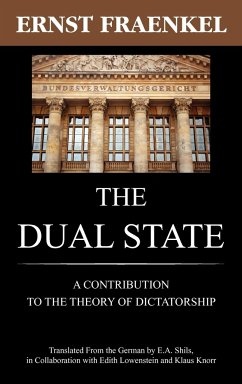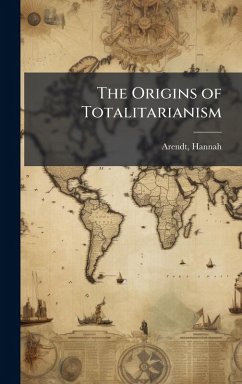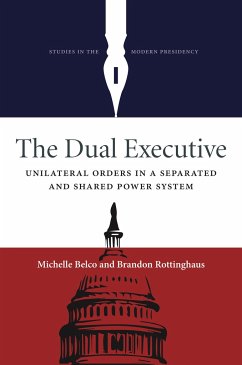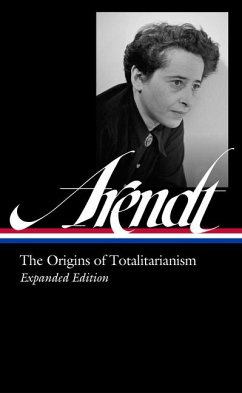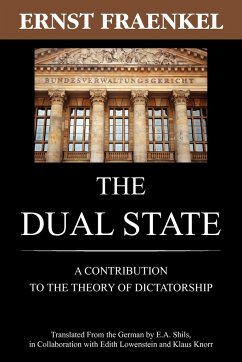
The Dual State
A Contribution to the Theory of Dictatorship
Versandkostenfrei!
Versandfertig in 1-2 Wochen
40,99 €
inkl. MwSt.
Weitere Ausgaben:

PAYBACK Punkte
20 °P sammeln!
An Unsparing Analysis of the Legal Principles and Constitutional Developments of the Third Reich This classic study is widely considered one of the finest analyses of totalitarianism. It was written in Germany in the late 1930s and completed in the United States in 1940, where Fraenkel lived after fleeing the Nazis in 1938. The title derives from Fraenkel's thesis that National Socialism divided the law into two co-existing areas. The first of these, The Normative State, protects the legal order as expressed in statutes, decisions of courts and the activities of administrative agencies. Its co...
An Unsparing Analysis of the Legal Principles and Constitutional Developments of the Third Reich This classic study is widely considered one of the finest analyses of totalitarianism. It was written in Germany in the late 1930s and completed in the United States in 1940, where Fraenkel lived after fleeing the Nazis in 1938. The title derives from Fraenkel's thesis that National Socialism divided the law into two co-existing areas. The first of these, The Normative State, protects the legal order as expressed in statutes, decisions of courts and the activities of administrative agencies. Its counterpart is the Prerogative State, which is governed by the party. It exercised "unlimited arbitrariness and violence unchecked by any legal guarantees" (xiii). As a detailed record of what has happened to the Rechtstaat under totalitarian auspices, this book is without rival.--Fritz Morstein Marx, Harvard Law Review 54 (1940-1941), 1267 Several scholars have published authoritative descriptions of the German political and legal system. Fraenkel's book differs from its predecessors in so far as it represents, to the reviewer, the first attempt to provide a theoretical analysis of the German legal order.--Otto Kirchheimer, Political Science Quarterly, Vol. 56, No. 3 (Sep., 1941), 434-436 Ernst Fraenkel [1898-1975], the renowned political scientist, is widely considered the father of the theory of pluralism in Germany. He served in the German Army during the First World War from 1914 to 1918, worked as a labor lawyer with the left-wing political activist Franz Leopold Neumann, and as a Social Democrat and a Jew, fled Germany to the United Kingdom in 1938, and then to the United States in 1939. It is said that the manuscript of this book traveled ahead as contraband. He served as legal counsel to Korea before returning to Germany in 1951. In 1963 he founded The John F. Kennedy Institute in Berlin. CONTENTS Preface Introduction PART I THE LEGAL SYSTEM OF THE DUAL STATE CH. I. The Prerogative State CH. II. The Limits of the Prerogative State CH. III. The Normative State PART II THE LEGAL THEORY OF THE DUAL STATE CH. I. The Repudiation of Rational Natural Law by National-Socialism CH. II. The National-Socialist Campaign Against Natural Law CH. III. National-Socialism and Communal Natural Law PART III THE LEGAL REALITY OF THE DUAL STATE CH. I. The Legal History of the Dual State CH. II. The Economic Background of the Dual State CH. III. The Sociology of the Dual State Abbreviations Notes Appendix Table of Cases Index





